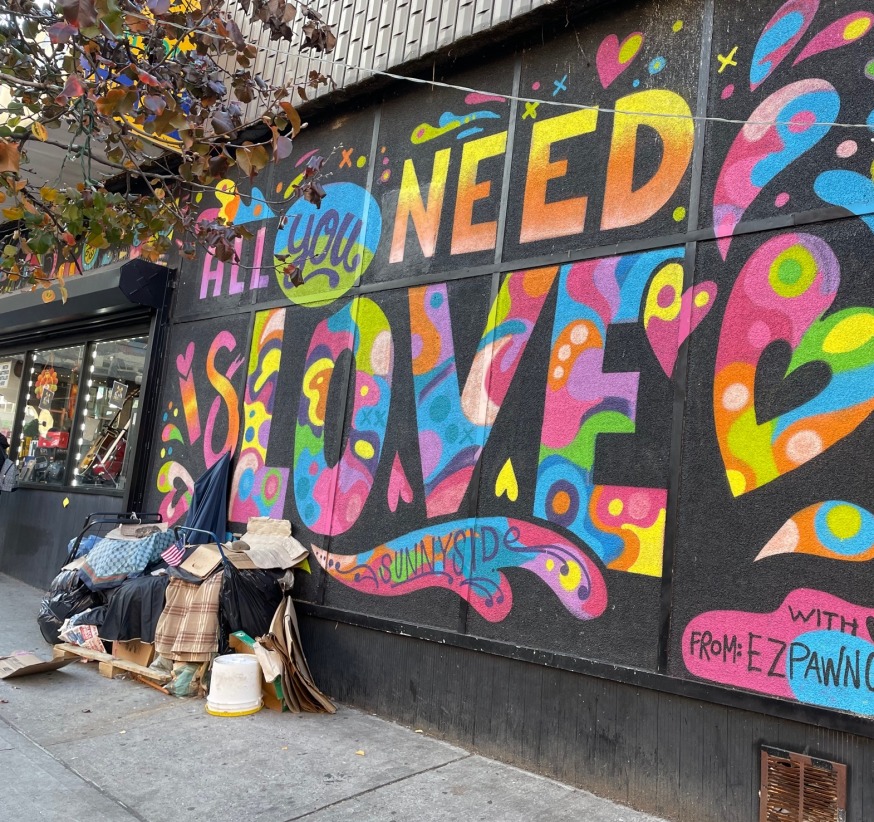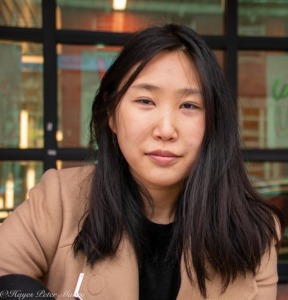
A homeless encampment in Sunnyside (Queens Post)
Feb. 17, 2021 Op-Ed By: Heajin-Hailie Kim
It was April, and our food pantry was stationed beneath the 46th street stop on the 7 line. A woman walked up to us, dressed in many layers against the chill, and asked for a jar of peanut butter.
“Someone stole mine,” she said. Her voice had a touch of defensiveness to it, and I thought she didn’t believe the food was truly free.
We’d chosen the location because of the small homeless encampment that gathered beneath the elevated subway station, and slowly, we began to recognize the men there, as well as the woman who had approached us.
A week later, I approached her, offering her a surgical mask. We chatted for a while, and I asked about her situation. Mainly, I wanted to know what would get her out of the cold, and into a shelter.
In a nutshell? Nothing. What I took for defensiveness about the food was an overarching desire to not take more than what she thought she deserved. She didn’t want to go into a shelter, citing the violence, the heightened chances of catching COVID-19, and most heartbreakingly, the fact that she thought she would be a burden on the government if she did so, saying that she didn’t feel comfortable with people paying $40,000 a year just to get her a place to sleep at night.
What she does want is clean, public housing and a job to help pay for it. She cited that the formerly incarcerated in her native Hong Kong where she emigrated from are given apartments in newly-built public housing units.

Heajin-Hailie Kim (Photo: Hailie Kim)
Our conversation inspired me to do some research, and I found that there was a more encompassing solution to homelessness than my new acquaintance had envisioned: Permanent Supportive Housing.
The basis of Permanent Supportive Housing is housing at a subsidized rate, along with services to help maintain that housing.
Such services include mental health services, medical services in general, and criminal justice costs.
It is crucial to remember that such services are necessary to increase the chances of helping integrate the formerly homeless back into society, and to prevent them from becoming homeless again.
Given that nearly one out of every 106 New Yorkers is homeless, solving chronic homelessness is an issue we must focus on in a more holistic manner than we’ve been taking so far. While we do have Permanent Supportive Housing in New York City, we have too little of it, and this is what we need to change.
Currently, we house the majority of our homeless in hotels. As of August 2020, midtown Manhattan has the most homeless hotels in the City, but such solutions should merely be temporary. Hotels give a sense of transience and not the sense of permanence that the homeless need to feel secure.
We are not addressing the underlying issues that result in or from chronic homelessness: mental illness, drug addiction, and lack of economic opportunity.
Permanent Supportive Housing would allow us to move past these reactive, ineffective bandage remedies towards solutions that actually work, and Permanent Supportive Housing works.
Studies have found that in a randomized test, 86 percent of participants were successfully housed and remained housed for several years though Permanent Supportive Housing. While it didn’t lower the need for medical care, it does lower the cost of homelesness for Americans in general.
In Denver, Permanent Supportive Housing saved $15,733 per year, per person in public costs for housing and all the other services provided through the program. Therefore, not only is this an effective program in solving the issue of chronic homelessness, it is an economically efficient one.
While Community Land Trusts, non-profit, community based organizations that help lower the cost of commercial and retail spaces as well as encouraging affordable housing prices, alongside a revamping the of the Mitchell-Lama program are excellent pathways to home-ownership and preventing people from losing their homes to begin with, and our public housing system needs a desperate revamp to ensure lower-income people are able to keep their homes, Permanent Supportive Housing is a particular kind of housing that can help relieve homelessness through the services they provide.
Like NYCHA, Permanent Supportive Housing is also something that is under the jurisdiction of the State, also like NYCHA, we need to fund it fully at the City level.
With the end of the eviction moratorium, countless more New Yorkers will lose their homes in the wake of COVID and the unemployment crisis we face.
However, homelessness had been spiking from 42,190 to 67,170 between 2011-2018, before the COVID crisis hit, which points to broader issues in our City regarding affordable housing and economic opportunities.
Homelessness, as it stands, is a systemic issue that deserves systemic solutions.
Heajin-Hailie Kim is a Sunnyside resident and a candidate in the race to represent the 26th Council District
14 Comments

At what cost, Heajin-Hailie Kim? At what cost?
A majority of the people living in hotels are from out of state. It’s a well known fact amongst people from non-sanctuary states that if they come to ny they’ll get everything *free. *Means we the blue collar taxpayers foot the bill.
Drive by any of these hotels/motels and look at the license plates on their cars, yes, they have cars! They’re usually all from the same states, NC etc…
Sunnyside is becoming worse with each passing year.
But at least Romantic Depot reopened on a full block on our busiest shopping ave!
The current homeless situations stems from a ridiculous and unsustainable court case of Callahan v Carey https://www.coalitionforthehomeless.org/our-programs/advocacy/legal-victories/the-callahan-legacy-callahan-v-carey-and-the-legal-right-to-shelter/
3 questions. Does anybody know who the head of the Department of Homeless Services is and what they do to earn their overpaid salary? Next – does anybody know who the head of NYCHA is and what he or she does to earn their overpaid salary? Lastly, the million dollar question – with all of the mentally ill committing crimes where are the millions of dollars that ThievesNY (uh ThriveNY) gets and do nothing Chirlaine, gets to run this scam of an organization?
Sara – I can answer all of your partisan fueled questions? What’s your point ? Where’s my million dollars ?
As a local case manager that works with this population in communities throughout queens I could not agree more with the sentiment in this article.
Wow, out of all the homeless people in NYC, you happened to find one of the most humble ones. Unfortunately, the majority of the homeless aren’t like this poor woman. It’s a sad truth. Heck, a good chunk of the people already in the projects aren’t willing to work for their homes and just wait for their monthly checks. If the majority of the homeless were like her, then no doubt this would be a worth while program. But we al know this not the case, and you want tax payer money to provide for their medical and mental health costs… no thanks. I hope this woman doesn’t exist and this was done just to push your narrative. But in the future, add the name of the studies you refer to because some studies, much like the example you used to push your agenda is askew.
There is an older woman who has about five carts among other belongings who sets up camp under the 46th Street Subway station. On a daily basis she moves all of this stuff across Queens Blvd. sets up camp under the Sunnyside Sign in front of Keyfood, where she sleeps. In the morning she moves everything back under the el. She has been here doing this routine for several years.,She needs some type of help. I’ve tried talking with her but she doesn’t appear to speak English. She is friendly and always gestures that she is fine.
It’s called section 8 housing
Section 8 housing is not available as readily as it was in the past. It is also difficult for someone who receives a voucher to find a landlord that will accept the voucher. Even still, as mentioned it is not addressing the underlying issues.
The only tenants I ever had to bring eviction proceedings against were all section 8 recipients. All. The only good thing about the program is the governments portion of the rent is in a separate check mailed by the government each month. The tenants portion was always two months late and short and they were living right next door.
People just need good paying jobs. Stop having our stuff made overseas particularly China who had the gall to stop domestic travel in and out of Wuhan but allowed international travel out of Wuhan last February.
You’re right. Trump let in THOUSANDS of Chinese nationals during the pandemic, and personally infected half of the White House with the Trump Flu.
Trump said he canceled all travel during the pandemic.